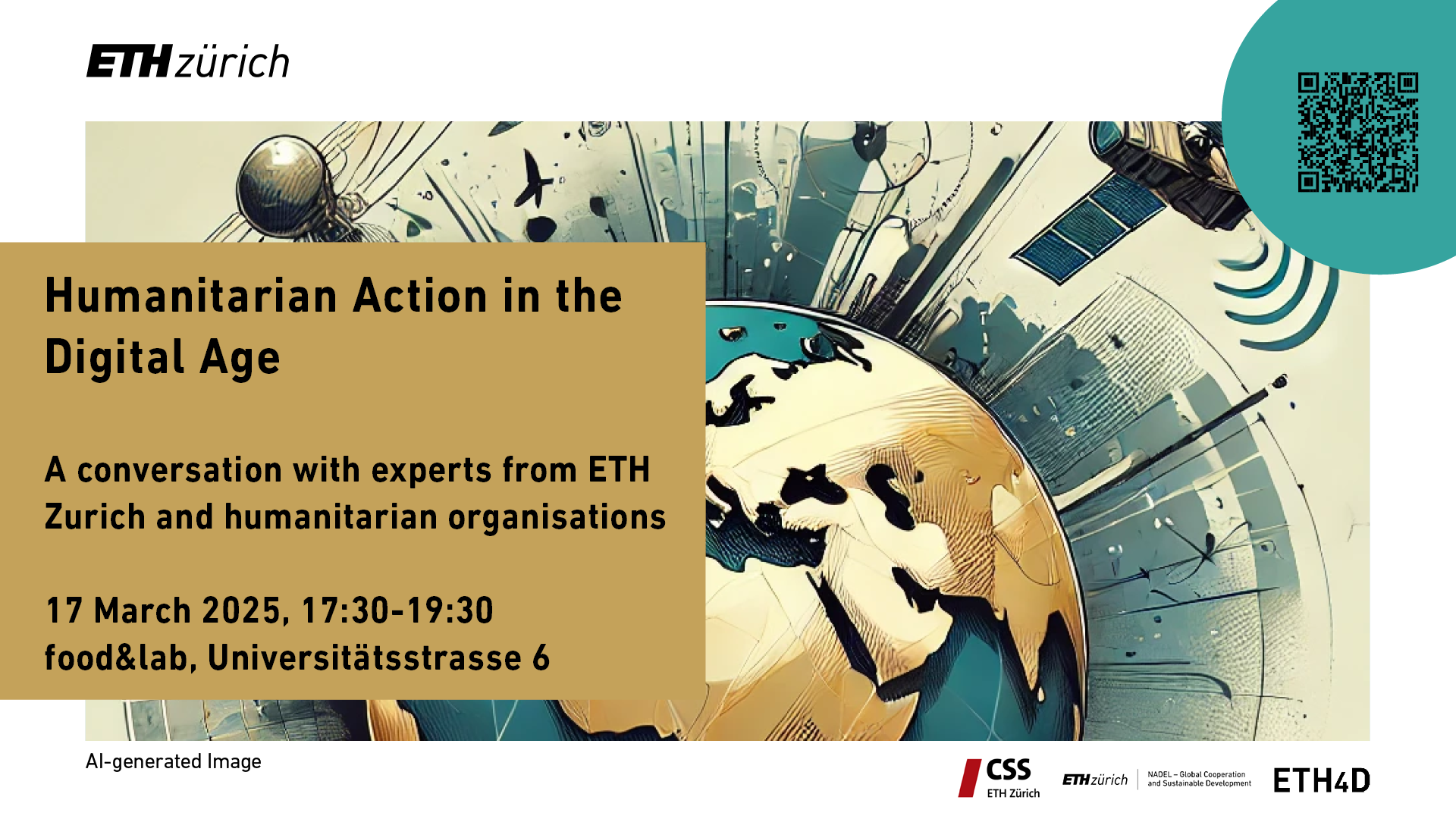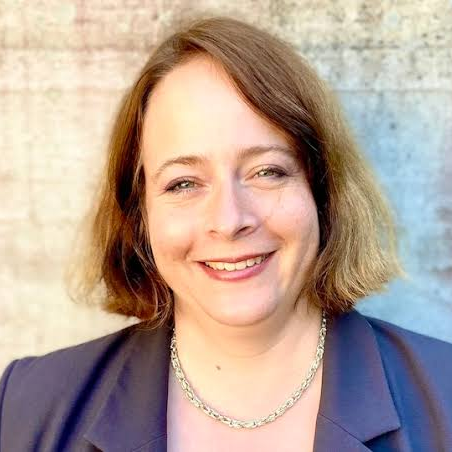Registration: Humanitarian Action in the Digital Age

As technology continues to reshape the humanitarian landscape, research and practice must work hand in hand to navigate both its opportunities and challenges. This event brings together ETH researchers and humanitarian practitioners to discuss how artificial intelligence and digital innovations are transforming humanitarian action.
The event will highlight collaborative research projects that enable humanitarian actors to prepare for the digital dimensions of armed conflicts and that leverage digital technologies and artificial intelligence to support humanitarian action.
These research presentations will set the stage for a panel discussion with experienced practitioners from the International Committee of the Red Cross (ICRC) and Médecins sans frontières (MSF), who will discuss their collaborations with researchers and the opportunities and challenges of implementing AI-driven solutions in their organisations.
Join us for a conversation that bridges research and practice, offering a deeper understanding of what it means to carry out humanitarian action in the digital age.
The event is co-organised by NADEL - Global Cooperation and Sustainable Development, the Center for Security Studies and ETH for Development.
Registration:
Confirmation: Registration Humanitarian Action in the Digital Age
Thank you for registering for the event "Humanitarian Action in the Digital Age". The event will take place at ETH Zurich, food&lab, Universitätsstrasse 6, 8006 Zürich on 17 March, 17:30-19:30.
Project Presentations
Timely identification of emerging crises is crucial for effective humanitarian response. While traditional monitoring methods remain essential, they can sometimes prove inadequate, particularly when humanitarian emergencies arise in remote or inaccessible regions. Our project addresses this challenge by exploring satellite nighttime light (NTL) data as a proxy for the identification of crises. Available daily, at no cost, and in near-real time, NTL data offers unique insights into changes in livelihoods and human activity. By combining deep learning techniques with qualitative research methods, we are developing a tool that proactively detects unusual changes in NTL, with the aim of enabling the early detection of humanitarian crises in conflict contexts relevant to the ICRC.
ETH PI: Dr. Corinne Bara (Senior Researcher at the Center for Security Studies)
EPFL PI: Prof. Dr. Devis Tuia (Environmental Computational Science and Earth Observation Laboratory)
ICRC: Dr. Thao Ton-That Whelan (GIS and remote sensing analyst)
Partners: Dr. Valerie Sticher (postdoctoral researcher in Department of Political Science at University of Zurich)
Effective planning and response to humanitarian crises depend on the knowledge of the local situation and the spatial distribution of populations. However, fine-scale population maps are often unavailable and not easy to generate. Especially in contexts affected by violence and conflict, maps and census information are often incomplete or outdated.
The project aims to estimate local size and density, as well as related information, such as settlement type and population changes, from satellite images and social media posts and integrate them into detailed, spatially resolved population maps. More information can be found in this paper.
ETH PI: Prof. Konrad Schindler, Photogrammetry and Remote Sensing, D-BAUG;
EPFL PI: Prof. DevisT uia, Environmental Computational Science and Earth Observation Laboratory, EPFL
Partners: Thao Ton That Whelan, ICRC; Ferda Ofli, Qatar Computing Research Institute
For humanitarian organisations such as the ICRC, the digitalisation of conflict environments poses a series of concerns related to physical, societal, and psychological cognitive risks to affected populations. The main objective of this project is to develop a methodological framework that enables humanitarian actors to develop awareness and preparedness of the digital dimension of armed conflict, which will be the basis to design adequate responses to people’s needs. A core deliverable will be a tool that can be used easily by humanitarian workers to better detect and document relevant factors, such as risks and harms, of digitalized conflicts in order to develop adequate protection-centred responses and to state and non-state actors.
Expected Impact: Strengthening the ICRC’s ability to provide adequate protection responses to individuals facing harm due to the digital(ised) elements in conflict settings
ETH PI: Dr. Myriam Dunn Cavelty
ETH Partners: Sean Cordey, Sara Kostenbader, Wiktoria Gajos, Khadijah Mustapha
ICRC Partners: Joelle Rizk (Digital Threats Advisor), Mayank Verma (Digital Risk project officer), Cléa Thouin (Protection in the digital age consultant)
Sophie Natter will present some of MSF’s experiences in using digital technology on social media to better understand what is happening in and around the contexts where MSF operates its medical humanitarian programs.
Sophie Natter is the International Head of Digital Engagement at Médecins Sans Frontières.
Panel dicsussion with:

Dr. Myriam Dunn Cavelty is a Senior Scientist and Deputy for Research and Teaching at the Center for Security Studies (CSS) at ETH Zurich. She specializes in the political and societal impact of digital technologies, cybersecurity, and strategic foresight. She has held research and teaching positions at institutions including the University of Zurich, Brown University, and the University of Copenhagen. In addition to her academic work, she advises governments, international organizations, and companies on cyber security and critical infrastructure protection. She is also co-editor-in-chief of Contemporary Security Policy.

Dr. Melissa McRae is an Australian Doctor, dual specialised in Emergency Medicine and Public Health. She has worked in the humanitarian sphere for the last 15 years in a range of roles including clinical care, medical operational strategy development, implement and evaluation, research, management and leadership and most recently medical ethics. Melissa has worked in government, non-government, and humanitarian sectors in low-, middle- and high-income countries across Australia, Africa, Asia, Middle East, Europe, and the Caribbean. Within the humanitarian sphere she has worked predominately with Red Cross and Médecins Sans Frontières (MSF), most recently as Medical Director for MSF Amsterdam Melissa currently works for the MSF Research Unit on Humanitarian Stakes and Practices.

Philippe Stoll is Senior Techplomacy Delegate at the International Committee of the Red Cross (ICRC). His work is at the intersection between governments, the humanitarian and the private sector with the objective to better protect people affected by conflicts from the impact of cyber warfare, AI or hate speech. At the ICRC, Philippe has managed strategic and public communications at Headquarters, as well as in Sierra Leone, Israel and the Occupied Territories and India. He holds Master’s degree in Economics from the University of Geneva.

Dr. Thao Ton-That Whelan is a Remote Sensing and GIS specialist at the International Committee of the Red Cross. She has been working in the humanitarian sector for almost 20 years, in Africa, Middle-East, Asia and now in Switzerland with a focus on GIS and remote sensing. With the ICRC, she is currently involved in several innovative projects, such as Remote Monitoring of Armed Conflicts through AI and Mapping Vulnerable Populations with AI. Thao holds a PhD in Geology.